《中国的出口管制》白皮书(双语全文)
新华网 2021-12-29 14:00

三、持续推进出口管制体系现代化
III. Modernizing the Export Control System
中国严格执行出口管制各项法律法规,将郑重承诺转化为实际行动,以制度为基础,以技术为支撑,逐步实现全覆盖、全链条、全方位的有效监管,构建设计科学、运转有序、执行有力的现代化出口管制体系。
China strictly enforces export control laws and regulations, and translates solemn commitments into concrete actions. With institutional foundations and technological support, China has gradually realized effective and comprehensive regulation and whole-process monitoring, and put in place a modern export control system providing scientific design, orderly operation and vigorous enforcement.
(一)优化许可管理
1. Improving License Management
中国的出口管制广泛采取国际通行的许可证管理、最终用户和最终用途证明、通用许可等制度。中国建立跨部门许可会商制度和两级管理模式,不断完善许可流程,不断丰富许可证管理种类,不断提升许可管理水平,有力促进出口管制物项合规贸易,优化高水平对外开放下的营商环境。
China widely adopts internationally-accepted practices in export controls such as license management, end-user and end-use certificates, and general licensing. China has established an inter-agency consultation mechanism and a two-tiered management model, optimized the licensing procedure and extending the types of license. License management has been steadily improved, to ensure that all trade in export-controlled items is consistent with compliance requirements, and to create a better business environment for high-level opening up.
建立许可会商制度,确保审查严谨准确。在两用物项出口许可审查环节,建立商务部、外交部、工业和信息化部、国家国防科技工业局、国家原子能机构、中央军委装备发展部等部门参与的出口管制许可会商制度。各部门各司其职、分工协作、密切配合,从国家安全和利益、国际义务、最终用户和最终用途等方面对出口申请进行审查,确保相关出口符合法律及相关政策规定。
An inter-agency consultation mechanism for prudent and accurate review. For the review of dual-use items, China has set up an inter-agency consultation mechanism that brings together the Ministry of Commerce, the Ministry of Foreign Affairs, the Ministry of Industry and Information Technology, the State Administration of Science, Technology and Industry for National Defense, China Atomic Energy Authority, and the Equipment Development Department of the CMC. These departments work closely together to review export applications, each carrying out its respective duties, taking into account factors such as national security and national interests, international obligations, end users and end uses, to ensure compliance with applicable laws and policies.
推行两级管理模式,便捷许可申请办理。中国地域广阔,申请出口许可的企业来自于全国各地。中国统筹兼顾管制和促进的关系,保障和促进合规贸易,在许可管理上推行两级管理模式,委托省级人民政府有关部门向出口经营者提供出口管制公共服务,协助其转报出口申请。许可审查的批准结果,通过网络数据化形式,传送至出口经营者和中国海关。为提高贸易便利化水平,2021年7月起,商务部对两用物项出口许可施行无纸化管理,实现业务申请、业务审核、许可证签发、货物通关全流程电子化,缩短办证时间5至7天。
A two-tiered management model to facilitate license applications. License applicants may come from any part of China. To strike a balance between export promotion and export control, and to protect and promote trade in controlled items that is consistent with compliance requirements, China adopts a two-tiered license management model. Provincial government departments are mandated to provide exporters with public export control services and re-submit their export applications to the central government. The results of reviews are sent to the exporters and China Customs via the internet. To facilitate trade, the Ministry of Commerce realized paperless license management for dual-use items in July 2021, employing digital tools through the entire process of application, review, license issuance and customs clearance. As a result, the licensing time frame was shortened by five to seven days.
完善许可管理措施,提升精准管理水平。以完善最终用户和最终用途证明制度为重点,推进多层次管理。一般情况下,要求出口经营者提供由最终用户出具的最终用途证明文件;对具有潜在风险的出口申请,要求提供经最终用户所在国家和地区政府机构和中国驻有关国家使领馆认证的最终用户和最终用途证明文件,或者要求最终用户所在国家和地区政府机构出具最终用户和最终用途证明文件。中国施行通用许可措施,丰富许可证管理种类,对建立出口管制内部合规制度且运行情况良好的出口经营者,在符合规定条件的情况下,可授予通用许可,允许其在有效期内多次向多个国家和地区或多个最终用户出口使用。多措并举的许可管理措施,提高了许可管理的针对性和有效性。
Improved measures for targeted license management. China promotes multi-tiered management with the emphasis on end-user and end-use certificates. Generally, an exporter is required to submit the end-use certificate provided by the end user; for export applications presenting a potential risk, the exporter is required to submit end-user and end-use certificates verified or issued by the government agencies of the country or region in which the end user is located, and by the Chinese embassy or consulate in that country or region. To extend the types of license, China grants general licenses to exporters with internal compliance programs and sound operating procedures, provided that they meet the necessary requirements. These general licenses allow them to export multiple times to multiple countries/regions or end users within the period of validity. The implementation of these measures has made license management more targeted and effective.
建立专家支持队伍,支撑科学高效管理。中国高度重视专家力量建设,以法律规定形式明确建立健全出口管制专家咨询机制。有关部门组织两用物项、军品、核等领域相关专家,建立出口管制专家支持队伍,协助作出科学准确判断。多年来,专家队伍对清单制定、许可管理、监督执法、业务咨询等工作提供了有力支持。随着出口管制工作专业化要求不断提高,中国将继续加大专家力量投入,打造一支领域全、业务精的专业队伍,为新时期出口管制工作提供更加专业、高效的支撑。
An expert team for informed and efficient management. China values the contribution of experts, and has created statutory provisions to establish and improve the export control expert advisory mechanism. Relevant departments have set up a team consisting of experts in dual-use items, military products, nuclear materials, and other areas, to facilitate informed and accurate assessment. Over the years, the expert team has provided robust support in the creation of lists, license management, monitoring and enforcement, and business consultancy. As export control becomes a more specialized field, China will continue to mobilize more experts to develop a team providing wide coverage and strong expertise, so as to provide more professional and effective support in the new era.
(二)提升执法能力
2. Strengthening Enforcement Capability
中国不断完善出口管制执法机制,拓展执法方式,提升执法能力,逐步健全权责统一、权威高效的出口管制执法制度,有效打击出口管制违法活动,保障出口管制法律法规得到完整、准确、严格实施。
China continues to reinforce its export control enforcement mechanism by expanding methods and sharpening capabilities. An authoritative and efficient system has gradually taken shape with consistent rights and responsibilities, which plays an important role in tackling violations and ensuring complete, accurate and strict implementation of relevant laws and regulations.
完善组织机构,构建协同有力执法机制。强化商务部的出口管制专门机构建设,2014年,商务部设立了专职出口管制执法队伍,负责出口管制执法制度建设、案件调查等工作。商务部、公安部、工业和信息化部、海关总署等部门加强横向协作执法,并与各省级人民政府相关部门纵向联动执法。各部门和地方横纵相间的执法协作制度,形成了严密的执法网格,为中国出口管制执法提供坚强的组织机制保障,较好解决了中国出口管制执法遇到的地域广、领域宽、查处难等问题。
Improved organizational structure for a coordinated and effective enforcement mechanism. In 2014, to strengthen institutions responsible for export control, the Ministry of Commerce set up a dedicated enforcement team, which is responsible for developing enforcement institutions and conducting case investigations. The Ministry of Commerce, the Ministry of Public Security, the Ministry of Industry and Information Technology, the General Administration of Customs, and other departments have strengthened collaboration on enforcement, and work on joint enforcement with relevant departments of provincial governments. With this horizontal and vertical cooperation among central departments and provincial governments, a closely-knit enforcement network is in place. It provides a firm institutional guarantee for enforcement of export control laws in China and effectively addresses the problems posed by geographical distance, wide spectrum, and difficulties in imposing penalties.
拓宽手段措施,增强执法监管威慑力。不断提升出口管制执法能力,除授权执法部门实地检查、询问调查、查阅资料等基本执法手段外,还赋予执法部门查封、扣押涉案物项,查询银行账户等多种手段。对违法的出口经营者,执法部门可以依法将其违法情况纳入信用记录,有效增强执法威慑力。中国的出口管制执法对出口各环节实施全覆盖,不仅严格监管出口环节,还对中介服务参与违法出口实施管控,禁止相关机构和个人为出口管制违法行为提供代理、货运、寄递、报关、第三方电子商务交易平台和金融等中介服务。中国注重推行监管谈话、行政指导等非强制性执法手段,实施预防、指导、监督等措施,确保执法效果。
Various enforcement measures to amplify the deterrent effect of enforcement and regulation. China continues to strengthen its enforcement capability. In addition to basic methods such as site visits, inquiries and investigations, and access to materials, the enforcement authorities are also authorized to employ other methods, including sealing off and detaining items and checking bank accounts. The enforcement authorities can also mark any illegal act into the credit record of an offender, which significantly reinforces the deterrent effect of law enforcement. Every aspect of the export process is covered by enforcement. In addition to the exporters, intermediary service providers are also subject to control to prevent illegal exports. Agencies and individuals are prohibited from providing offenders with intermediary services such as agency, shipping, consignment, financing, customs declaration, and third-party e-commerce platform transactions. China also values the role of non-compulsory enforcement methods such as regulatory interviews and administrative guidance, and implements preventive, guiding, and monitoring measures to ensure that enforcement is effective.
推进执法装备和信息化运用,切实强化保障能力。中国加大出口管制执法装备设施投入,中国海关配备专门用来测检放射性、生物和化学等物项的专业设备,显著提高识别、检查和处置出口管制物项的效率,有效帮助执法人员侦测违法出口。中国积极改进执法信息运用,加强执法、管理等机构有关非法出口活动信息的交流合作。中国重视出口管制违法案件信息数据统计分析,实现涉案企业、案情等基本信息综合运用功能,健全信息化支撑。出口管制执法机构定期对执法官员进行全面的政策法规、物项识别及执法技能培训,提升执法能力。
Improved enforcement equipment and IT application to strengthen guarantees. China has increased inputs into enforcement equipment. With professional equipment to detect radioactive, biological and chemical items, China Customs is able to inspect and detect illegal exports more efficiently, thus helping enforcers to dispose of controlled items more effectively. China has also improved the use of enforcement information by sharing information among enforcement and regulatory agencies. China attaches great importance to collecting information and analyzing statistics on violations. Basic information on companies involved is integrated with case descriptions through use of information technologies. To boost enforcement capacity, the enforcement authorities regularly provide enforcers with training on export control laws and regulations, and on identification and enforcement skills.
(三)推进合规建设
3. Developing Export Control Compliance Systems
中国高度重视出口管制合规建设,坚持“政府引导、企业为主、多方联动”的原则,夯实法律基础,完善政策框架,开展宣传培训,推动出口管制合规建设取得积极成效。
China is committed to developing export control compliance systems. Based on the principle of government-guided, business-led, and coordinated action, China has made notable progress in building export control compliance systems by consolidating the legal foundations, improving the policy framework, and investing in publicity and training.
加强法治保障。注重夯实合规建设的法治基础。《出口管制法》明确,中国政府部门适时发布有关行业出口管制指南,引导出口经营者建立健全出口管制内部合规制度以规范经营。明确激励措施,对建立出口管制内部合规制度且运行情况良好的出口经营者,可依法给予通用许可等便利措施。中国以法律的形式,为政府有效引导出口管制合规建设提供法治保障,为企业建立健全内部合规制度提供法律依据。
Intensified legal guarantee. China has been working to reinforce the legal foundations of export compliance. The Export Control Law requires the Chinese government to issue sector-specific guidelines for export controls at the appropriate time, guiding exporters to establish and improve their internal compliance programs and to operate in accordance with laws and regulations. As an incentive, an exporter with an internal compliance program and sound operating procedures can be granted a general license or other facilitating measures. These provisions provide a legal guarantee for the government to provide guidance on export control compliance, and a legal basis for businesses to establish and improve their internal compliance programs.
加强政策指引。2007年,商务部首次发布两用物项和技术经营企业建立内部出口控制机制的指导意见。2021年,商务部修订并发布《商务部关于两用物项出口经营者建立出口管制内部合规机制的指导意见》,将合规要素拓展为9个,包括拟定政策声明、建立组织机构、全面风险评估、确立审查程序、制定应急措施、开展教育培训、完善合规审计、保留资料档案和编制管理手册。新增《两用物项出口管制内部合规指南》,提供更详尽指引和场景化参考。在核领域中国发布了核进出口合规管理机制建设指南等文件。
Improved policy guidance. In 2007, the Ministry of Commerce first issued guiding opinions on internal export control mechanisms for exporters of dual-use items and technologies. In 2021, the Ministry of Commerce revised and issued the Guiding Opinions on Establishing the Internal Compliance Program for Export Control by Exporters of Dual-use Items, which increased the number of compliance elements to nine - policy statement, organizational structure, comprehensive risk assessment, screening procedures, contingency measures, compliance training, compliance audits, record-keeping and management manual. The Guidelines for Internal Compliance for Export Control of Dual-use Items was added to provide more details and scenarios for reference. In the field of nuclear materials, China promulgated Guidelines for Import and Export Compliance Mechanism Building of Nuclear Items and other government documents.
加强公共服务。高度重视出口管制合规宣传培训,不断加大宣传力度,提高全社会合规水平。各级政府深入企业调研座谈,针对重点领域开展培训,夯实出口管制合规意识,培育出口管制合规文化。近年来,年均举办多形式培训和研讨交流20余次,约3万人次参加。2021年,商务部启动出口管制信息服务平台建设,加大指导和服务力度。积极引导商协会、中介机构、专家智库等社会资源开展出口管制合规研究,提供咨询服务,共同参与出口管制合规建设。
Improved public services. The Chinese government attaches great importance to information and training on export controls, and has continued to disseminate information to increase compliance across broader society. Government authorities at all levels have paid study visits to enterprises and provided training in key areas to raise awareness and foster a compliance culture. In recent years, around 30,000 people have participated in over 20 training sessions and seminars every year. In 2021, the Ministry of Commerce launched an export control information service platform to provide better guidance and services. The Chinese government provides guidance to business associations, chambers of commerce, intermediary agencies, experts and think tanks, to help them study export controls, provide consultancy, and play an active part in export compliance.
(四)履行国际义务
4. Complying with International Obligations
中国一贯主张全面禁止和彻底销毁核武器、生物武器和化学武器等大规模杀伤性武器,坚决反对此类武器及其运载工具的扩散,不支持、不鼓励、不帮助任何国家发展大规模杀伤性武器及其运载工具。中国致力于规范常规武器贸易,打击武器非法贩运,缓解常规武器滥用引发的人道主义问题。中国坚定维护有关国际条约的权威性和有效性,严格履行国际义务,维护国际和地区和平稳定。
China consistently advocates the complete prohibition and thorough destruction of weapons of mass destruction (WMD), including nuclear, biological and chemical weapons, and resolutely opposes the proliferation of such weapons and their means of delivery. China does not support, encourage or help any other country in the development of WMD and their means of delivery. China is committed to regulating the trade in conventional arms, combating illicit trafficking of weapons, and mitigating humanitarian issues triggered by the abuse of conventional arms. China firmly upholds the authority and efficacy of all relevant international treaties, strictly complies with its international obligations, and safeguards international and regional peace and stability.
在核领域,中国于1984年加入国际原子能机构,1988年与国际原子能机构签署《中华人民共和国和国际原子能机构关于在中国实施保障的协定》,自愿将本国民用核设施置于该机构的保障监督之下。1992年,中国加入《不扩散核武器条约》。中国积极参与日内瓦裁军谈判会议有关《全面禁止核试验条约》的谈判,为该条约的达成作出重要贡献,并于1996年首批签约。1997年10月,中国加入“桑戈委员会”。1998年,中国签署关于加强国际原子能机构保障监督的附加议定书,并于2002年初正式完成该附加议定书生效的国内法律程序,成为第一个完成上述程序的核武器国家。2004年6月,中国加入“核供应国集团”,积极参与“集团”相关事务,履行“集团”权利义务。
Nuclear. China joined the International Atomic Energy Agency (IAEA) in 1984 and signed the Agreement Between the People's Republic of China and the International Atomic Energy Agency for the Application of Safeguards in China in 1988, voluntarily placing China's civilian nuclear facilities under Agency safeguards. In 1992, China acceded to the Treaty on the Non-Proliferation of Nuclear Weapons (NPT). China was actively engaged in the negotiations on the Comprehensive Nuclear Test Ban Treaty (CTBT) of the Conference on Disarmament in Geneva, making a major contribution to the conclusion of the Treaty to which it was one of the first State Party signatories in 1996. China became a member of the Zangger Committee in October 1997. In 1998, China signed the Additional Protocol aimed at strengthening the IAEA safeguard system, and formally completed the domestic legal procedures necessary for the entry into force of the Additional Protocol in early 2002, thus becoming the first nuclear-weapon state to complete the relevant procedures. In June 2004, China joined the Nuclear Suppliers Group (NSG) and has since taken an active part in the NSG while fulfilling the relevant rights and obligations.
在生物领域,中国1984年加入《禁止生物武器公约》,一贯严格履行公约义务。中国始终按时全面提交履约建立信任措施宣布材料,深入参与公约审议进程,在规范生物科研活动、生物技术和资源全球分配等领域积极提出多边倡议,在加强生物实验室安全等领域积极向国际社会提供公共产品,不断加强生物两用品及相关设备和技术的出口管制,及时修订管制清单。中国倡导推动公约审议进程取得积极成果,特别是谈判制定具有法律约束力的核查议定书,以全面加强公约有效性。
Biological weapons. China strictly honors its obligations under the BWC, to which China became a State Party in 1984. Since then, China has submitted declarations of Confidence Building Measures in full and on time, been fully involved in the BWC reviews, and actively proposed multilateral initiatives on regulating biological scientific research exercises, biological technology, and global resource allocation. China has offered the international community public goods in reinforcing laboratory biosecurity and other areas, tightened export controls on dual-use biological items and related equipment and technologies, and revised its control list in a timely manner. China calls for positive outcomes in the BWC reviews, particularly regarding the negotiations for a legally binding verification protocol to maximize the effectiveness of the BWC.
在化学领域,中国为达成《禁止化学武器公约》作出积极贡献。1993年1月,中国签署公约。1997年4月,中国递交批准书,成为公约的原始缔约国。中国坚定支持公约宗旨和目标,推动各方严格履行义务,平衡、有效落实公约各项条款。自公约生效以来,中国按照公约要求颁布国内履约立法,设立专门履约机构,并按时、完整地提交各类年度宣布,严格接受禁化武组织相关视察。2020年,中国按照公约规定时限,完成《禁止化学武器公约》第24届缔约国大会增列附表1化学品的国内立法程序。
Chemical weapons. China made a positive contribution to the conclusion of the CWC, which it signed in January 1993. In April 1997, China deposited its instrument of ratification, becoming an original State Party of the CWC. In strong support of the Convention's purposes and objectives, China encourages all States Parties to strictly fulfill their obligations, and implements the provisions in a balanced and effective manner. Since the Convention entered into force, China has adopted a series of laws for domestic compliance as required by the Convention, set up agencies dedicated to compliance, submitted annual declarations in full and on time, and firmly committed itself to the inspections by the Organization for the Prohibition of Chemical Weapons. As required by the Convention, in 2020 China completed the domestic legislative procedures for the amendment to Schedule 1 reached at the 24th CWC Conference of States Parties.
在导弹领域,中国支持国际社会为防止导弹及相关物项和技术扩散所作出的努力,对国际上有关加强导弹防扩散机制的建议持积极和开放的态度。中国借鉴多国出口管制做法,颁布实施《导弹及相关物项和技术出口管制条例》,使中国导弹领域物项和技术出口有了法律依据。中国还积极参与相关国际交流和合作,共同致力于防止弹道导弹扩散。
Missiles. China supports international efforts to prevent the proliferation of missiles, and missile-related items and technologies, and adopts a positive and open attitude to international proposals designed to strengthen the mechanisms for non-proliferation. Drawing from other countries' export control practices, China has promulgated and implemented the Regulations of the People's Republic of China on Export Control of Missiles and Missile-related Items and Technologies, which provide the legal basis for China's export of missile-related items and technologies. In addition, China takes an active part in relevant international exchanges and cooperation to prevent the proliferation of ballistic missiles.
在军品领域,中国积极参与《武器贸易条约》谈判,对条约的达成作出重要贡献。2019年9月,中国宣布启动加入《武器贸易条约》相关国内法律程序。2020年7月,中国正式加入《武器贸易条约》。中国作为条约缔约国,坚定支持条约的宗旨和目标,全面履行条约义务,并愿与其他缔约国一道,共同致力于规范常规武器贸易,促进条约普遍性和有效性,完善武器贸易全球治理。
Military products. China actively participated in the negotiations on the Arms Trade Treaty (ATT) and made a significant contribution to the conclusion of the Treaty. China announced that it would initiate the domestic legal procedures to join the ATT in September 2019, and formally acceded to the Treaty in July 2020. As a State Party, China firmly supports the Treaty's purposes and objectives through full compliance with its obligations, and stands ready to work with other States Parties to regulate the trade in conventional arms, promote the universality and effectiveness of the Treaty, and improve global governance of the arms trade.









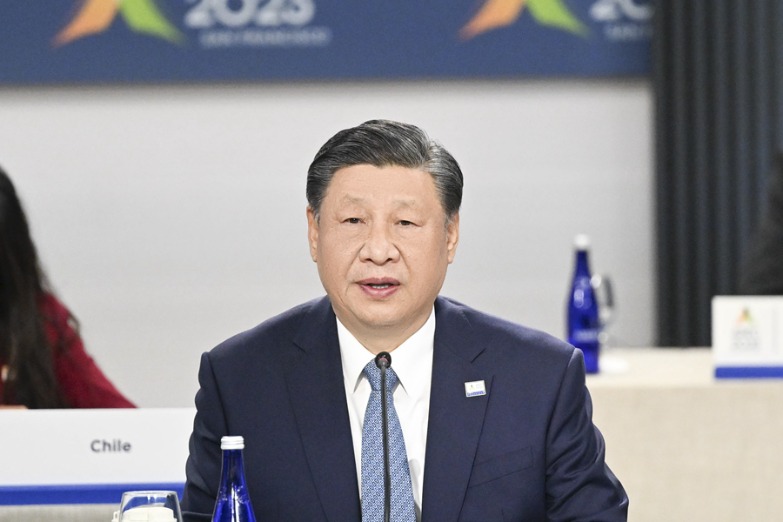
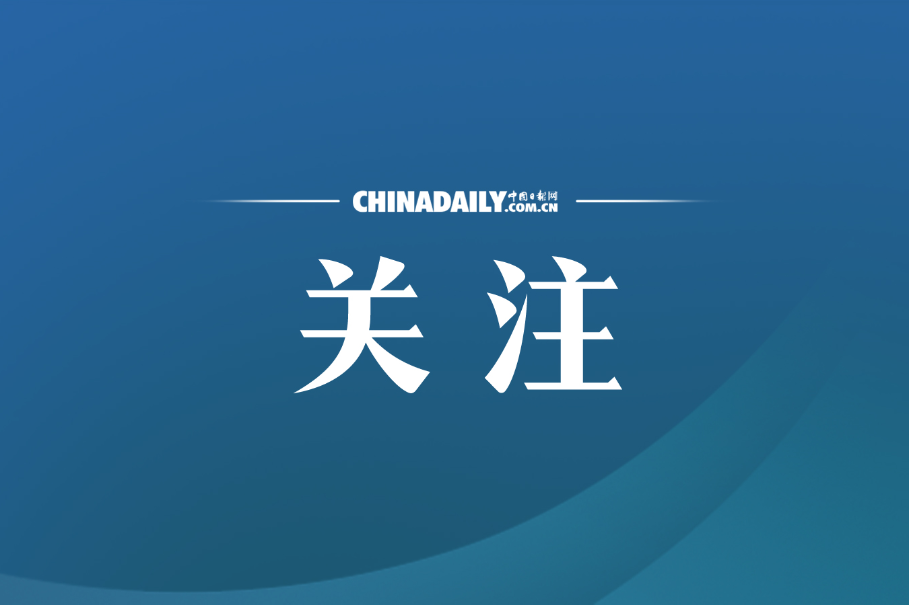
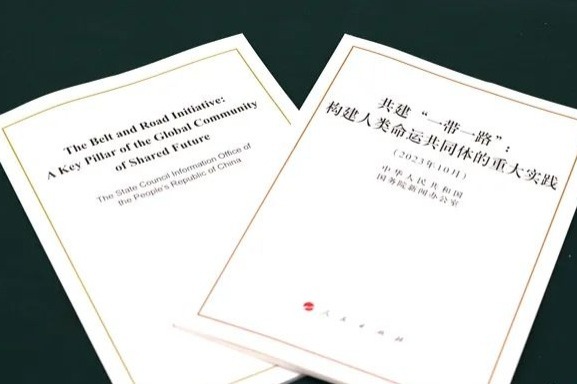
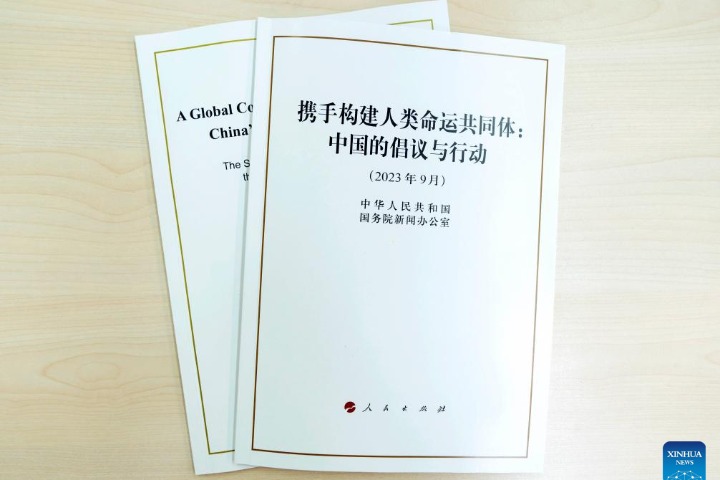
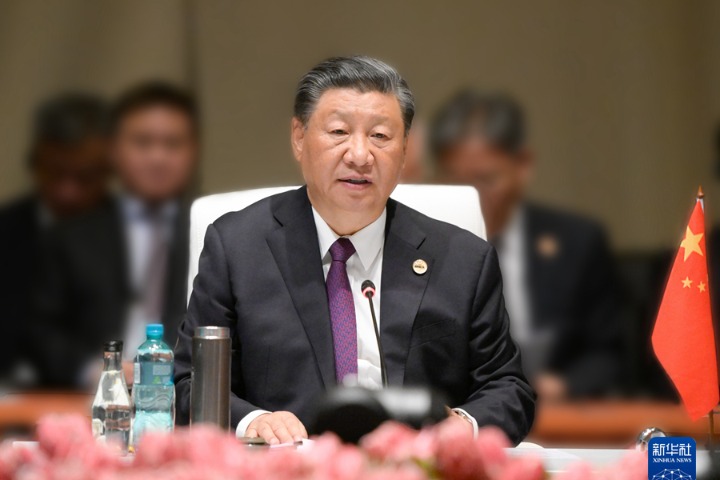



 英语点津微信
英语点津微信 双语小程序
双语小程序